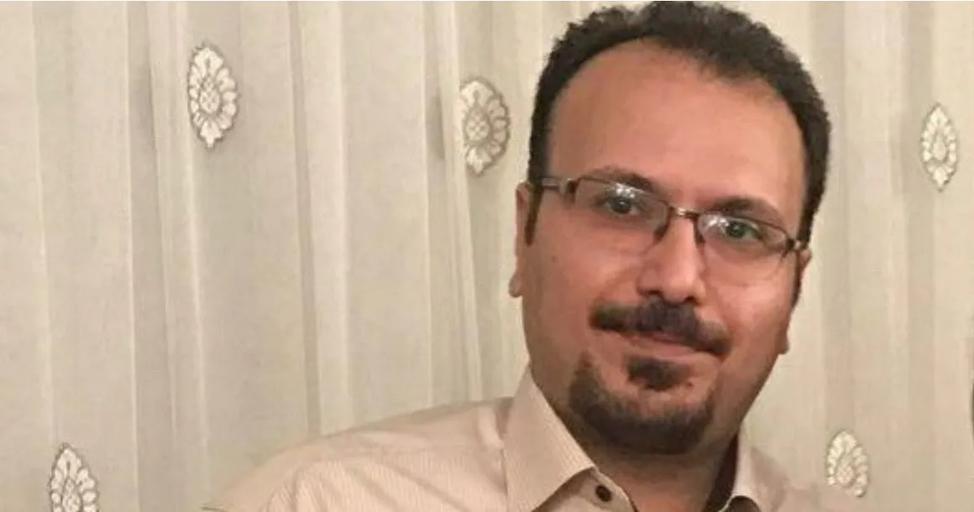برای خواندن این مطلب به فارسی اینجا را کلیک کنید
Ahmadreza Haeri, a prominent civil activist and political prisoner, is once again imprisoned and serving a multi-year sentence. This latest imprisonment represents a recurring chapter in his ongoing struggle for justice and democracy in Iran.
Haeri’s latest legal woes began when he was arrested on June 27, 2022, and subsequently sentenced to three years and eight months in prison for charges related to “assembly and collusion with the intent of committing a crime against national security.” An additional eight-month sentence was added for alleged “propaganda activities against the system.” These convictions led to his recent return to Evin Prison on May 10, 2023, following pressures on his bail guarantor.
The collusion sentence stemmed from Haeri granting interviews to various media outlets and composing letters to various authorities. This includes a message to the UN Special Rapporteur on the negative impact of unilateral coercive measures (sanctions) on human rights, Alena Douhan, in advance of her fact-finding trip to Iran. The letter, signed by five political and human rights activists, highlighted the limitations of civil organizations and government-sponsored associations in reflecting the true sentiments of the Iranian people, emphasizing the importance of engaging independent activists. They stated “The Islamic Republic and its representatives who are talking to you are not representatives of the majority of the Iranian people because they have not attained their current positions in a democratic process.” Regrettably, both Haeri and renowned advocate Keyvan Samimi were subjected to legal repercussions as a result of their involvement.
Haeri, a civil activist originally from Ilam now residing in Tehran, has been arrested and imprisoned for his activism before this incident. In 2014, he was a spokesperson for families of political prisoners in Ward 350 of Evin Prison and was imprisoned and subjected to corporal punishment for participating in protests against their mistreatment. Upon appeal, Judge Salavati reduced his 42-month prison sentence to six months and 74 lashes for his activism. On July 25, 2020, he was transferred to Tehran’s Great Prison (Fashafoyeh) to serve his sentence. He was conditionally released on October 8, 2020 only to be re-arrested on June 27, 2022.
Adding to his legal predicament, Haeri was sentenced to three months and one day in prison in July 2023 while still incarcerated. This was based on a complaint filed by the Tehran Prison Organization regarding his tweets and writings on the conditions of political prisoners, including the tragic deaths of Sasan Niknafs and Amirhossein Hatami in Great Prison (Fashafoyeh). The sentence for “spreading falsehoods” came when the deaths of Niknafs and Hatami garnered significant attention with the families filing a “premeditated murder” lawsuit. Sasan Niknafs died in June 2021 due to illness and inadequate medical care in Fashafouyeh Prison.
Haeri has also been targeted for advocating for annulment of an undisclosed Supreme National Security Council resolution concerning the status of political prisoners and the influence of security agencies on their judicial proceedings. He has persistently highlighted that since 2006, all matters concerning political prisoners, such as conditional release, furlough, and electronic monitoring, are subject to the approval of the Ministry of Intelligence and the Intelligence Organization of the IRGC following confirmation of this resolution.
Despite these challenges, Haeri’s commitment to human rights remains unwavering. In September 2023, Haeri and 11 other political prisoners were unlawfully transferred from Evin Prison to Ghazal Hesar Prison where they were placed with violent offenders, contradictory to legal codes and the standard of separating different categories of prisoners. The other political prisoners subjected to these conditions in Ghazal Hesar Prison included Saeed Masouri, Jafar Ebrahimi, Loghman Aminpour, Afshin Baymani, Zartosht Ahmadi Ragheb, Reza Salmanzadeh, Sepehr Imamjomeh, Hamze Savari, Masoudreza Ebrahiminejad, Saman Seydi (Yasin), and Mohammad Shafiei.
Their situation became so dire that the Iranian Writers’ Association issued a warning, expressing concern over the possibility of “another deliberate crime” and warning that the 12 prisoners are in grave danger of losing their lives.
Despite these challenges, Ahmadreza Haeri wrote to the head of the judiciary outlining the events surrounding the exile of 12 political prisoners from Evin to Ghazal Hesar Prison, the increasing security pressures placed upon political detainees, and the undue influence of security officers on the judicial system. Haeri’s letter decried the blatant interference of bodies such as the Supreme National Security Council in the independence of the judiciary, resulting in what he calls “judicial apartheid” and the erosion of fundamental rights. However, these appeals have not led to relief, as Haeri and his fellow political prisoners are still being held in Ghazal Hesar.
Haeri’s continued dedication to the plight of political prisoners, calling for humane treatment within the prison system and raising public awareness, shows his continued dedication to human rights and justice.
Haeri remains incarcerated, facing the challenges of a substandard prison environment. While he has encountered numerous obstacles throughout his journey, including separation from his daughter, he remains undeterred in his pursuit of justice and democracy.
Ahmadreza Haeri’s experience is a poignant reminder of the enduring struggle for human rights and democracy in Iran, where individuals like him persist in the face of adversity to champion justice.
Back to top
